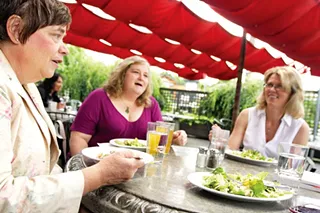“This is not a diet,” proclaims author Krista Vernoff in the foreword to The Game On! Diet: Kick Your Friend’s Butt While Shrinking Your Own. “Diets suck and are stupid and are not fun.”
No, Vernoff’s not an expert about medical issues, but she writes about them on TV. As executive producer of Grey’s Anatomy, Vernoff has proven prowess at creating deeply moving, hilariously bold characters and situations. She brings her humor and authenticity to this not-diet book, sharing personal struggles with lying, food addiction and a sedentary lifestyle.
Making her case for why Game On! works differently than other diets, Vernoff continues: “If you have any rebellious spirit in you whatsoever, you’re gonna rebel against the deprivation of a diet. Whether you rebel at the beginning, the middle or at the end … the results will be the same: You’ll eat like crazy and refuse to move your butt an inch off the couch for weeks.”
She and co-author Az Ferguson provide built-in solutions for that rebellion, including one day off per week.
|
The buzzwords in diets are “moderation” and “portion control.” But Bryan Wansink, author of Mindless Eating: Why We Eat More Than We Think and director of the Food and Brand Lab at Cornell University,
— ANNE McGREGOR |
Here’s the basic plan: Play with a team of three or four people, against another team of the same size. You receive six points each for five small meals a day, 15 points for sleeping at least seven hours, 10 points a day for drinking three liters (nearly a gallon) of water. There are also points for adopting a new healthy habit and dropping a bad one. No diet drinks or refined sugar are allowed. There are penalties for extra snacking and alcohol. You get 20 daily points for exercising 20 minutes. The team with the most points after four weeks wins.
Doesn’t sound revolutionary, but Vernoff swears it is. So do other women who’ve succeeded in the 28-day game. But for those in the thick of the not-diet, there is struggle.
“It’s torture for a sugar addict,” confesses Dawn Troxel, of Spokane. “Plus, I’m impatient, I don’t have a lot of will power, and I don’t like following rules.”
But at the start of her third week of Game On!, Troxel says that the lifestyle changes are getting easier.
“I’m feeling better, and when I go to eat my old favorite foods [on a day off], they don’t taste as good as they did before.”
“I can actually walk by a tray of cookies and not eat one,” says Judith Kampf, one of Troxel’s Game On! partners, who is 40 pounds lighter than when she started her first round of Game On! nearly a year ago.
“Yes,” Troxel is quick to point out, “if I bail, the whole team suffers. So I don’t — but I am more than willing to take snack penalty hits.”
Game On! veteran Christy Branson says the team concept is key to keeping promises to ourselves and others.
“On our own, we all say, ‘I’ll start Monday,’” says Branson. “‘I’ll be stronger then,’ or ‘I’ll have more will power tomorrow,’ and there’s always something that gets in the way,” she says. “If it’s just me, who cares? But if I have to tell someone I ate cake, then that’s different.”
DROP THE DONUTS
Staff members at Providence Adult Day Health in north Spokane say the same things about last winter’s in-office Biggest Loser contest, which they plan to start again this fall.
“We felt like we were competing with ourselves, but we had to be accountable to people here,” says clinic program manager Megan McCoy, who competed to lose weight for her son’s wedding.
“We would tease each other,” says McCoy. “If someone brought donuts, we’d say, ‘Oh, here you have this!’”
Eventually, even among people who were not participating in the contest, staff support emerged in the form of fruit and vegetable trays instead of donuts.
“Having healthy snacks in between” was important for contestant Jessica Johnson, a recreation specialist. “If you don’t let yourself get to the starving point, you don’t eat as much. When I started eating more, smaller portions, after a while I was pretty satisfied.”
There is medical credibility behind both the concepts of smaller meals and team dieting.
“Based on science, we know weight loss is most effective when there is group support,” states the American Dietetic Association’s website (www. eatright.org).
And Spokane registered dietician Craig T. Hunt says our bodies operate optimally with the Game On! and Biggest Loser concepts of five small meals.
“You’re not efficient with a big meal. It stresses your digestive system,” says Hunt. “The main purpose of eating multiple times a day is to keep up your energy, which is connected to blood sugar level. Unless it’s a large meal, it will be metabolized in three to four hours.”
The brain’s cortex, responsible for things like creativity and reason, depends on even blood sugar levels to make logical, healthy choices.
“When you lose too much glucose,” Hunt explains, you start to feel starved, and your cortex feels threatened. “Your primal or reptilian part of the brain is activated and produces that need to eat forbidden food … You will go to the nearest drive-though and indulge to feed the primal brain.”
Branson says that being prepared with fruit, cheese sticks and almonds will not only keep you out of a drive-through, it will save your Game On! score and increase your productivity.
“I was having ups and downs,” she says. “I was on a blood-sugar rollercoaster. The small meals made my energy levels and emotional states more even. That’s helped me to be more active. It has taught me to balance my life.”
Kampf has tried her share of other diet plans, “but there’s a total lifestyle focus with Game On! that isn’t in other diets.”
That focus on lifestyle changes and accountability is the key to successful group efforts
McCoy says her group worked individually while competing to be the “biggest losers” but that it was fun to “compare with and support each other … and share ideas.”
“Having a structure and a discipline helps,” says Kampf. She also valued the personal contact and recipe swapping. “There are a lot of things you can eat that are actually enjoyable,” she admits.
“I’m finding this week easier,” says Troxel during her Game On! month. “I’m feeling better. I don’t want to go back to eating piles of sugar. ”
And in an email just a week after feeling like giving up, Troxel’s teammate Barbara Comito wrote: “I think I may actually be changing some of my behavior for the long term. Being ‘off’ yesterday felt weird, and I found myself missing some of my Game On! foods. Bring on the veggies!”
HEALTHY CONNECTIONS
Hunt says the communication available in a team dynamic is vital, particularly for women.
“We use food sometimes to fi ll our discomfort of not connecting with people,” he says. “You can see how this [team concept] is an awesome positive. You’re using the power of numbers and people to create accountability.
“There’s a power to sharing your struggle that goes pretty deep,” Hunt adds. “There’s a whole lot of healing that can go on.”
And many small victories, too, like exercising for 20 minutes at 11:20 pm just because you said you would, losing two pounds in a week, or zipping up previously too-tight jeans. Those are also very healing.
Vernoff wraps up her Game On! pitch in this same spirit.
“Come to this game knowing that you are playing because you are alive and you are vibrant and you are capable and you want to live your fullest, happiest, healthiest life.”
To get started with either diet, check out their websites: www.thegameondiet.com and www.thebiggestloserclub.com.















